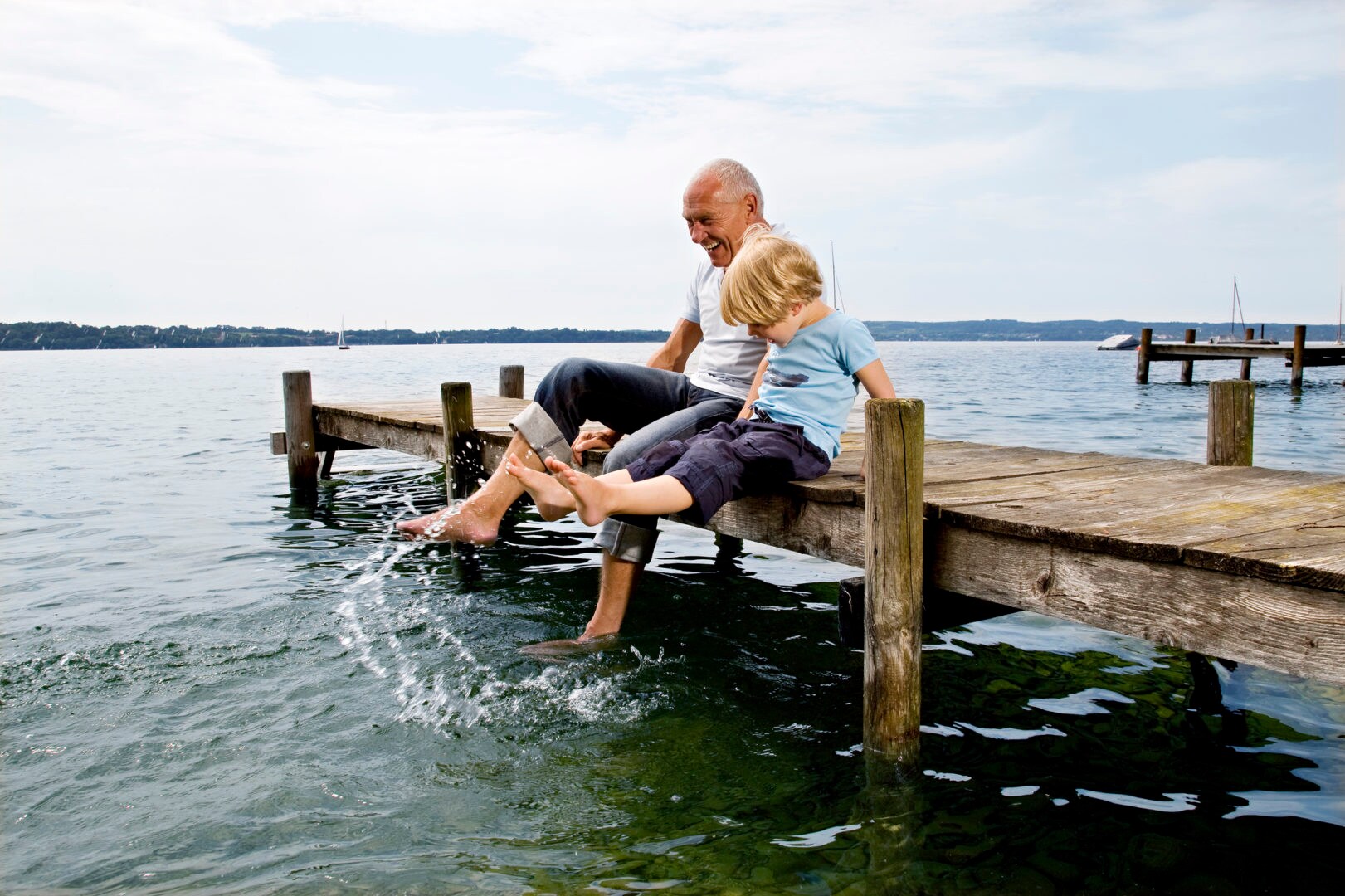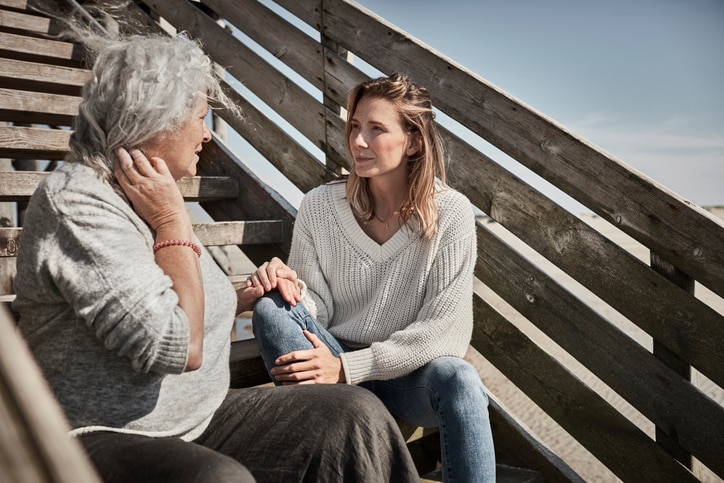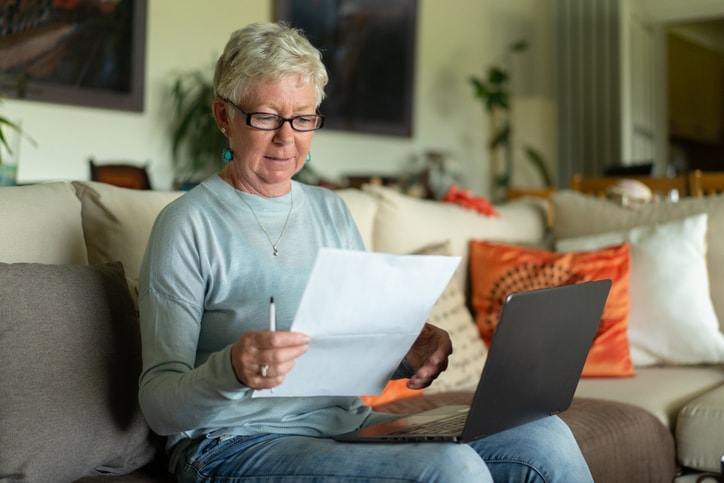So you’ve decided to book a family vacation that includes your aging parents. Now you’re wondering how you can make sure the memories you create on the trip are the kind you’ll remember fondly (not the ones you’ll want to forget). The answer, according to adult children who have done it, is to plan carefully — and then to expect that those plans will change.
A few years after her father passed away, Kathleen Payne flew her mother across the country from New York to Portland, Oregon, and then to Los Angeles. She and her wife wanted to visit family on the West Coast and Payne was eager to show her mother a place she had never been.
“My parents had really loved to travel,” she says.
And while they had been all over the world, her mother had never been to Portland. Payne’s mother had dementia.
“She was getting to the point where she would forget things soon after you told them to her and so she would get easily confused,” Payne says. “We figured out that it would be nice while my mother was able to pay attention to the world, to go on one last trip.”
Tips for traveling with senior parents
Thinking of taking a trip with your aging parent? Here, Payne and others share important tips for traveling with senior parents.
1. Plan meticulously
Whether your loved one has dementia or not, planning meticulously for a trip with older adults is the key to success.
“It made me feel like Napoleon plotting to win one of his campaigns,” Payne says.
She arranged for someone to care for her mother’s cat while she was away, as well as someone to care for her own cats. She made sure she had an ample supply of her mother’s medications. She carefully considered how and when to fly. Should they make a stop or fly straight through? What was the best time to arrive so her mother could adjust to the three hour time difference?
Anthony Cirillo, president of the Aging Experience, suggests using this checklist to plan a vacation that both you and your parent will enjoy.
- Get medical clearance. Start with your parent’s physician to determine if they are capable of handling a trip and use your best judgment.
- Pack medicine and paperwork. Take all pertinent medical information with you including a list of medications, advance directives and medical records.
- Plan out flying. Allow for longer connection times and arrange for cart transportation inside the airport.
- Make driving comfortable. Consider a rental vehicle with more space and accessible features.
- Ensure safety abroad. If you are leaving the country consider the Smart Traveler Enrollment Plan, a free service from the U.S. Department of State that allows U.S. citizens traveling abroad to enroll their trip with the nearest U.S. Embassy or Consulate.
2. Try to maintain routines
Focus on preserving your loved one’s routine as best as possible, particularly their eating and sleeping schedules, because small or unfamiliar changes can often feel overwhelming and stressful, particularly to someone living with dementia.
“For those taking a trip with someone with Alzheimer’s, the normal stresses of traveling can be even more challenging,” says Charles J. Fuschillo Jr., president and CEO of the Alzheimer’s Foundation of America (AFA). “Following a few simple, important steps can help caregivers make the trip as safe, pleasant and comfortable as possible for their loved one.”
If they have certain meal and bed times, stick as closely as possible to them. For Payne, that also meant making sure her mother could watch Wheel of Fortune and Jeopardy! every night, just like she did at home.
3. Allot time for adjustment
Payne and her wife rented a house on the Oregon coast so both their families could vacation together. Due to her mother’s dementia, Payne even thought through when everyone would arrive. They decided to give her mother time to settle in and adjust to her new surroundings before the others arrived.
“We got to the house two days early and arranged for her to have own TV and her own bathroom,” she says.
To keep her mother occupied, Payne came prepared with her mother’s favorite audiobooks and a jigsaw puzzle.
4. Plan frequent breaks
The AFA also advises planning your mode of travel and timing your trip in a manner that causes the least amount of anxiety and stress, and then taking breaks along the way for snacks, restroom visits or rest. Elizabeth Miller, who has taken several road trips with her mother, concurs. Miller’s mother does not have dementia, but due to other health issues, she is oxygen dependent and wheelchair bound. Miller has had to carefully plot out drive times, rest area strategies and overnight breaks.
“I learned that McDonald’s is the best place to take an aging parent to the bathroom,” she says, because she can park right by the door.
Rest areas typically place the facilities a distance from the parking area and the walk tires Miller’s mother. Miller has driven with her mother from her home in Atlanta to a family home on northern Michigan several times.
“It’s a journey,” she says.
The normally 16-hour drive takes them much longer. Well before they hit the road, Miller starts planning. The trip requires her to get an approved oxygen tank on wheels, keep her mother’s insulin refrigerated, find hotels with handicap accessible rooms and that are easy for Miller to set up her mother’s sleep apnea machine.
“It’s a big test on your patience,” she says. “The way you do everything is just a process. You have to let go of all expectations of how long a stop should take.”
5. Remember to relax and enjoy your time together
Raquel Cooper, who took her then 80-year old mother to Washington, D.C., in 2017 to visit the monuments and the National Museum of African American History and Culture, is grateful for the memories that trip created, despite some challenges she encountered while they were traveling.
“Although it was extremely challenging tactically and emotionally, I am glad we went,” Cooper says. “My mother was a huge supporter of President Obama, so going to the nation’s capital during his administration was important to her and to me. In hindsight, I would have opted for a shorter trip, maybe two and a half days vs. four. However, I have no regrets about our last real vacation together.”
Miller, too, is grateful, for the time shared and memories created with her mother.
“A blessing on long trips is sharing lots of stories,” she says. “Mom told me her memories of going to camp in Michigan. We listened to podcasts together, and I tried to listen to music that she liked in the car.”
Payne is also glad she made the trip out West with her mother.
“I do have really good memories of that time,” she says.





